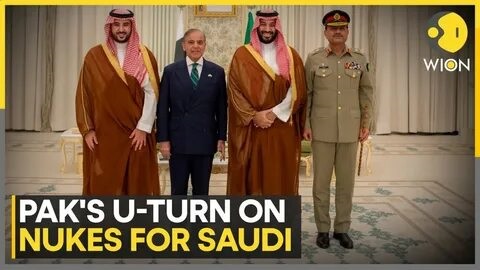
The announcement of a strategic defence pact between Saudi Arabia and Pakistan has many ramifications for us and for the region, writes Kanwal Sibal, a distinguished Indian diplomat and former Foreign Secretary of India, who served as Ambassador to Turkey, Egypt, France, and Russia.
Some commentators in India are arguing that this defence pact is directed at Israel and not India. The immediate trigger, it is being said, was the Israeli attack on Qatar. All these years, the Gulf countries, and Saudi Arabia in particular, with its massive oil resources, depended on the US for their security. Now they can no longer, as the US is fully backing Israel. Besides this, Trump’s political base is against the US getting involved in conflicts abroad and acting as the policeman of the world.
This dwindling confidence in the US as a guarantor of security in the region had already led Saudi Arabia to begin normalising its ties with Iran.
The fact remains that the US has major military bases in the region, in Qatar and in Bahrain. The US Navy is active in the region. The US has been protecting commercial shipping in the Red Sea and acting against Houthi threats. It has militarily attacked Iranian nuclear installations, something the US has never done before. The fact is also that the Gulf states are supportive of Israeli efforts to eliminate what are seen as Iranian proxies in the region, be it Hamas or Hezbollah. Despite Israel’s deadly military campaign against the Palestinians in Gaza and accusations against it of committing genocidal acts, the UAE, Bahrain, Sudan, and Morocco have not broken diplomatic ties with Israel.
Israel’s violation of Qatar’s sovereignty in conducting air strikes against Hamas leaders located on its territory seems to have precipitated the Saudi decision to sign the strategic defence pact with Pakistan. The “strategic” element in this is the nuclear weapon umbrella that Pakistan is providing to Saudi Arabia.
Bringing in this nuclear element into the equation would be unsettling for the region. On the one hand, Iran continues to be subject to intense pressure to prevent it from going nuclear, even though it disclaims any intention to do so, and its programme has been subject to IAEA inspections. It has been argued that if Iran went nuclear, Saudi Arabia would do so too in time. On the other hand, by accepting Pakistan’s nuclear umbrella, Saudi Arabia is now bringing in nuclear weapon deterrence in the Gulf. This could be seen as a nuclear challenge by Iran. This is bound to complicate the security issues in the Gulf region.
The assumption that Pakistan’s nuclear capacity will act as a deterrent to Israel in West Asia assumes that Israel could use nuclear weapons against the Gulf states. No Gulf state is powerful enough to threaten the existence of Israel, and Israel does not need to use nuclear weapons against Saudi Arabia. Israel has no reason to threaten the existence of Pakistan either. So, why is Pakistan’s nuclear arsenal being brought into the security arrangements in the Gulf?
This strategic defence pact between Saudi Arabia and Pakistan rehabilitates Pakistan as a responsible state. It also politically legitimises Pakistan’s nuclear arsenal as a stabilising element regionally.
Significantly, the head of the US Central Command was in Riyadh when the defence pact with Pakistan was signed. (Oddly, Ali Larijani, head of Iran’s National Security Council, was in Riyadh too on the same day.) One can assume that the US is not against Pakistan playing a security role in the Gulf and taking the burden off the US, in the way the US wants Europe to share the security burden in Europe.
This would be part of the Trump administration’s policy of strengthening ties with Pakistan and adding to strategic pressures on India, the latest being the decision to revoke the earlier waiver and impose sanctions on the Chabahar port project in Iran, in which India is participating. It is an important connectivity project that facilitates India’s access to Afghanistan and Central Asia.
read more in our Telegram-channel https://t.me/The_International_Affairs

 9:36 21.09.2025 •
9:36 21.09.2025 •






















